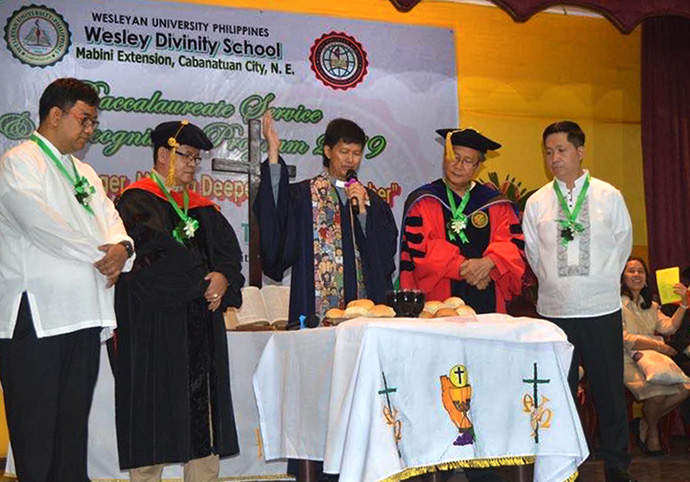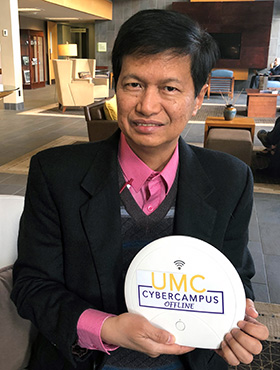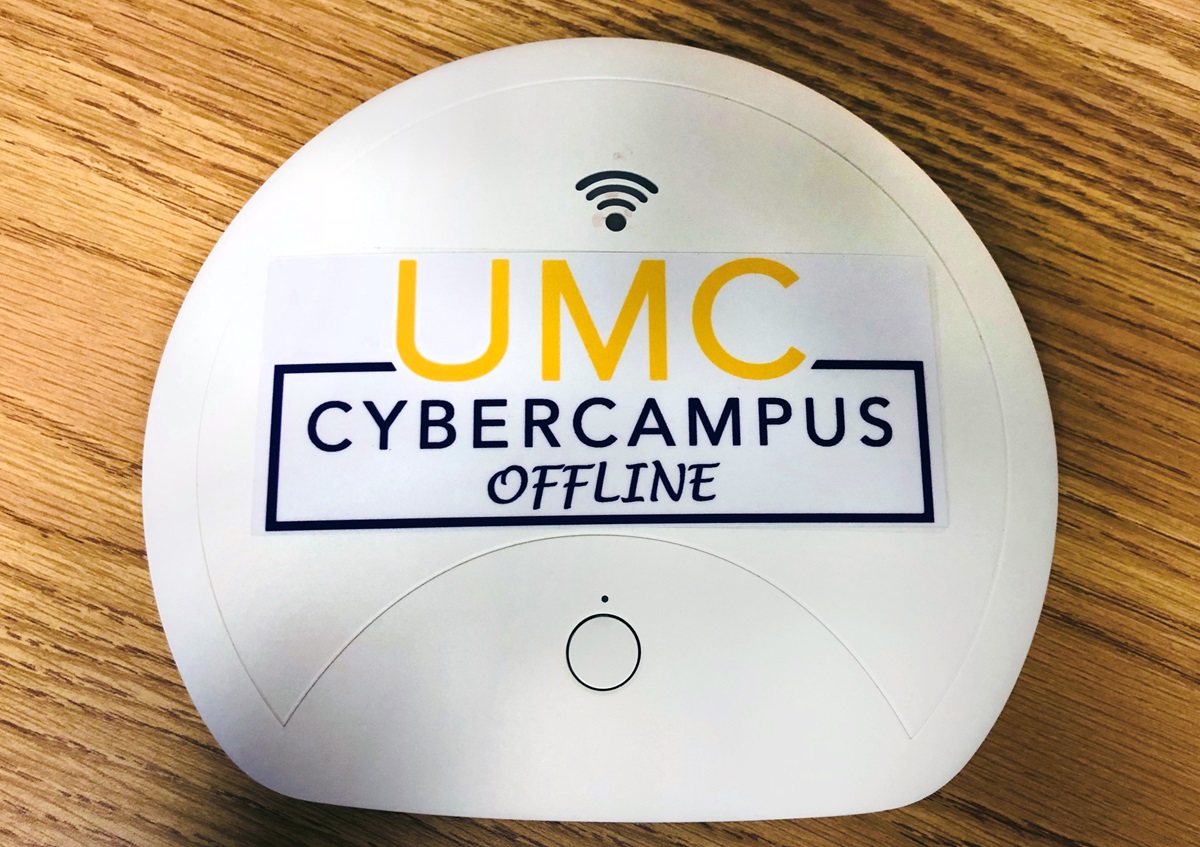United Methodist church leaders in remote regions of the Philippines now can access church educational materials without an internet connection thanks to a new cyber-campus program.
With a portable “UMC Cyber Campus Offline” device, laity and clergy are able to download digital educational resources. The gadget is designed for United Methodists with limited internet access who live far from the church’s schools, seminaries and universities.
The United Methodist Board of Higher Education and Ministry, which has been leading efforts to educate students in remote areas since 2014 with its E-Reader Project, launched the new UMC Cyber Campus Offline program in the Philippines in November. The initiative is an expansion of the church’s digital education in the region.
The offline device contains saved digital resources. It can be used without data costs for the distribution of multimedia content to about 50 students and faculty at the same time within a 150-foot radius.
“The goal of the UMC Cyber Campus Offline is to reduce the gap between those who have internet access and those who don’t,” said the Rev. HiRho Park, executive director of professional development and the UMC Cyber Campus program for Higher Education and Ministry. “The hotspot device can be used in a community of a remote area to download, open (and) access materials provided by the UMC Cyber Campus.”
The device also can be used during internet outages.
According to Wired.com, the United Nations estimates that at the end of 2019, 3.8 billion people were not connected to the internet. That includes regions in the Philippines.

“There are still many areas in the Philippines that cannot be reached by the internet or Wi-Fi,” said the Rev. Sergio E. Arevalo Jr., president of the University Senate of the Philippines Central Conference. “They might have an internet connection, but the speed is not fast enough to download needed files and stream videos. … The Philippines has one of the slowest internet connection speeds across the Asian Pacific.”
Arevalo, chairman of the Board of Ordained Ministry for the Middle Philippines Conference, said the content delivered via the church’s cyber campuses is useful for the continuing education and academic and spiritual uplifting of clergy and laity, noting that the church leaders can use the materials at their own pace.
He said the addition of the hotspot device is beneficial to gather and share educational materials in remote areas.
Bishop Pedro M. Torio Jr. of the Baguio Area received the first UMC Cyber Campus Offline device in November. He said he is excited about its prospects.

Bishop Pedro M. Torio Jr. of the Baguio Area in the Philippines shows off the first United Methodist Church Cyber Campus Offline device, which he received for his area in November. The gadget is designed for United Methodists with limited internet access who live far from the church’s schools, seminaries and universities. Photo by the Rev. HiRho Park, United Methodist Board of Higher Education and Ministry.
“It will be very useful for people in the Philippines who do not have access to internet but are interested in accessing books that are needed for their study in the field of specialization,” he said. “I saw a lot of materials that can be accessed for teaching. The possibilities (of using it) are limitless.”
Torio is the chairperson of the Commission on Central Conference Theological Education Fund and is assigned to the Philippines Central Conference Division of Ordained Ministry. He also led the University Senate in developing the first accreditation standards for United Methodist theological educational institutions in the Philippines.
He said there are many ways to use the UMC Cyber Campus Offline device.
“(Students) can have access to the open theological library,” he said. “There are a lot of good journals there in different fields of discipline, and they can access books (and) video lectures. Access is a very important thing for Filipino students, as are seminaries. And professors in the Philippines now have a community hotspot device they can use for developing their own teaching visuals, their PDF materials, their essays, their books. And even if there is no internet access, they can share all of these teaching materials to at least 50 students around them.”
Torio said he hopes the UMC Cyber Campus Offline will be used within his conference, as well as other central conferences (church regions in the Philippines, Africa and Europe).
“I hope that I can share this with practically all the colleges related to the Baguio Episcopal Area and the whole Philippines Central Conference and that they will invest in this gadget,” he said.
Park said the portable UMC Cyber Campus Offline is an opportunity to widen the horizon of digital education and help to provide quality content to all members of the global church.
“Evangelism is a lifetime task for Christians,” said Park. “As a worldwide church, we have to remember those who do not have the benefit of modern technology. Now, we can reach out to those in remote areas with digital resources.”
Kim is director of Korean and Asian news of United Methodist News in Nashville. Contact him at 615-742-5470 or newsdesk@umcom.org. Gladys P. Mangiduyos, a communicator in the Philippines, contributed to this report.
To read more United Methodist news, subscribe to the free Daily or Weekly Digests.
Like what you're reading? Support the ministry of UM News! Your support ensures the latest denominational news, dynamic stories and informative articles will continue to connect our global community. Make a tax-deductible donation at ResourceUMC.org/GiveUMCom.




